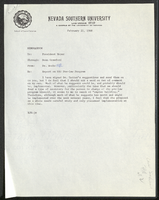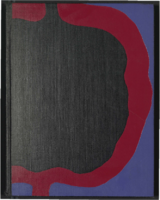Search the Special Collections and Archives Portal
Search Results
Brenda Pearson (Clark County Education Association) oral history interview conducted by Magdalena Martinez and Peter Grema: transcript
Date
Archival Collection
Description
From the Lincy Institute "Perspectives from the COVID-19 Pandemic" Oral History Project (MS-01178) -- Education sector interviews file.
Text

Nevada Southern University law program: reports and correspondence
Date
Archival Collection
Description
Folder contains memorandums, correspondence related to the law program at Nevada Southern University (later UNLV). It includes a report on the NSU law program (fall term 1967-1968), a report of the Association of American Law Schools Committee on Guidelines for New Law Schools (1966), and a report of Dean Willard H. Pedrick, Arizona State University College of Law (1967). From the University of Nevada, Las Vegas William S. Boyd School of Law Records (UA-00048).
Text

William O'Neill McCurdy Sr. oral history interview: transcript
Date
Archival Collection
Description
Oral history interview with William O'Neill McCurdy by Claytee D. White on January 26, 2022 for the African Americans in Las Vegas: A Collaborative Oral History Project. In this interview, McCurdy describes his childhood growing up in Las Vegas, Nevada, graduating from Valley High School, and attending Western Nevada College in Carson City, Nevada. He worked for many years for the Parks and Recreation department, and has served on numerous boards including the Citizens' Advisory for Regional Transportation (RTC), Habitat for Humanity Board of Director, Mineral County Economic Advisory Committee, City of Las Vegas Community Block Grant Advisory Board, and Southern Nevada Regional Housing Authority Commission. Currently, McCurdy owns McCurdy & McCurdy Media Group, a political consulting and advertising firm which has assisted numerous political candidates in fulfilling their dreams of helping to govern Las Vegas, Clark County, the State of Nevada, and even in the United States Congress.
Text

Stephen Round oral history interview: transcript
Date
Archival Collection
Description
Oral history interview with Stephen Round conducted by Claytee D. White on October 25, 2017 for the Remembering 1 October Oral History Project. In this interview, Stephen A. Round, a career military contractor, describes his experiences during the 2017 mass shooting in Las Vegas, Nevada. Round mentions moving to Las Vegas in 2013 and in later years staying at the Aria on the evening of October 1. He describes the chaos of the shooting and the 12-hour-plus lockdown at the Aria hotel and casino. The day after the shooting, Round built a memorial around the shooting site and protected it. Once the memorabilia of that first site was taken to the Clark County Museum, he moved to protect the second memorial at the "Welcome to Las Vegas" sign where crosses devoted to the victims had been placed. Along with his preservation of the memorials, Round describes his preparation of a book that was signed by many who visited the sites. Round explains that he was able to see some of the best and worst of humanity during those days of watching and caring for the memorial sites as well as helping any victims, families of the victims, and sympathizers of the Las Vegas 2017 shooting.
Text

David Becker oral history interview: transcript
Date
Archival Collection
Description
Oral history interview with David Becker conducted by Claytee D. White and Barbara Tabach on May 15, 2018 for the Remembering 1 October Oral History Project. In this interview, Becker recalls being on a three-day assignment at the Route 91 Harvest Country Music Festival across from the Mandalay Bay Resort in Las Vegas, Nevada. Thinking the gunfire was produced by malfunctioning equipment, he took photos of the scattering crowd. Moments later, in a now silent venue, he realized he captured a horrific massacre. Becker recalls photographing people leaving the venue as they performed acts of heroism, helping the fallen or the slow to reach safety. He discusses how difficult it is to comprehend the acts of that night, and how his photojournalist instincts allowed him to capture such devastating images.
Text

Joy Rineer oral history interview: transcript
Date
Archival Collection
Description
Oral history interview with Joy Rineer conducted by Claytee D. White on December 07, 2017 for the Remembering 1 October Oral History Project. In this interview, Rineer discusses her upbringing in Las Vegas, Nevada. She describes her career as an architect, designing the Resilience Center for those affected by the 1 October shooting, and the city’s response to the shooting. Later, Rineer describes helping the grief-stricken city through architecture, establishing the Leadership Las Vegas program, and organizing blood drives. Lastly, Rineer discusses the changes in Las Vegas after the tragedy.
Text
Julian Escutia-Rodriguez (Mexican Consulate of Las Vegas) oral history interview conducted by Magdalena Martinez and Elia Del Carmen Solano-Patricio: transcript
Date
Archival Collection
Description
From the Lincy Institute "Perspectives from the COVID-19 Pandemic" Oral History Project (MS-01178) -- Community organization interviews file.
Text

Epilogue: UNLV Yearbook, 1969
Date
Description
Yearbook main highlights: schools and departments; detailed lists with names and headshots of faculty, administration and students; variety of photos from activities, festivals, campus life, and buildings; campus organizations such as sororities, fraternities and councils; beauty contest winners; college sports and featured athletes; and printed advertisements of local businesses; Institution name: University of Nevada, Las Vegas
Mixed Content

June Monroe and Kazuko Atomura oral history interview: transcripts
Date
Archival Collection
Description
Oral history interviews with June Monroe and Kazuko Atomura conducted by Cecilia Winchell and Stefani Evans on July 14 and July 19, 2022 for Reflections: the Las Vegas Asian American and Pacific Islander Oral History Project. In the first interview, Kazuko Atomura describes her childhood in Taiwan and Tokyo, Japan, and shares both happy and difficult mememories of that time. Atomura eventually moved to Los Angeles, California, where she reconnected with a man she previously met in Japan. She married him and together had their daughter, June Monroe, and another son while living in Corpus Christi, Texas. After difficult medical procedures involving Atomura's husband and Monroe's younger brother, Brian, the family relocated to Las Vegas, Nevada. Monroe recalls attending Las Vegas High School and Bonanza High School, and the struggle of making new friends as a young person. In the second interview, the mother and daughter discuss racism, discrimination, and identity. Kazuko Atomura recalls her many experiences with discrimination as a result of both her appearance and language barriers. June Monroe discusses how she came to be proud of her Japanese heritage, while Atomura discusses some of the community activities she has been involved in since living in Las Vegas including the Japanese Culture Club and odori dancing. Then, both Atomura and Monroe discuss Monroe's brother, Brian, who received two kidney transplants; one from Monroe's father and one from Monroe herself. Atomura talks about the shrines she has built for Brian, the experience of him being on dialysis, care taking, and his final days. Monroe shares about her activism with organ donation, being regularly involved with the Nevada Donor Network and helping to pass significant pieces of legislation within the area of organ donation.
Text

Elena Newman oral history interview: transcript
Date
Archival Collection
Description
Oral history interview with Elena Newman conducted by Cecilia Winchell and Stefani Evans on April 11, 2022 for the Reflections: the Las Vegas Asian American and Pacific Islander Oral History Project. In this interview, Newman discusses her childhood in Dagupan, Pangasinan, Philippines. At the age of eighteen, she moved to Singapore for better work opportunities to help support her family. After meeting her husband, the couple moved to Las Vegas, Nevada. Since moving to Las Vegas, Newman has spent her time working as both a guest room attendant and shop steward at Mandalay Bay. She is also a part of the Culinary Workers Union, and she discusses how helpful the union is to the livelihoods of the many workers in the casino industry.
Text
